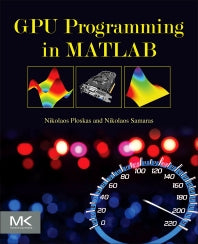Freshly Printed - allow 10 days lead
Couldn't load pickup availability
GPU Programming in MATLAB
This comprehensive guide to GPU programming in MATLAB provides coverage of the Parallel Computing Toolbox and other MATLAB toolboxes for GPU Computing, which allow applications to be ported straightforwardly onto GPUs without specialized knowledge of GPU programming
Nikolaos Ploskas (Author), Nikolaos Samaras (Author)
9780128051320, Elsevier Science
Paperback, published 28 July 2016
318 pages
23.4 x 19 x 2.1 cm, 0.68 kg
"With GPU programming becoming commonplace, such a dedicated, detailed and highly readable book on this subject is a welcome addition. This textbook should be on the bookshelf of any MATLAB programmer who plans to employ GPU parallelization." --Yair Altman, author: Accelerating MATLAB Performance? (CRC Press, 2014), http://UndocumentedMatlab.com
GPU programming in MATLAB is intended for scientists, engineers, or students who develop or maintain applications in MATLAB and would like to accelerate their codes using GPU programming without losing the many benefits of MATLAB. The book starts with coverage of the Parallel Computing Toolbox and other MATLAB toolboxes for GPU computing, which allow applications to be ported straightforwardly onto GPUs without extensive knowledge of GPU programming. The next part covers built-in, GPU-enabled features of MATLAB, including options to leverage GPUs across multicore or different computer systems. Finally, advanced material includes CUDA code in MATLAB and optimizing existing GPU applications. Throughout the book, examples and source codes illustrate every concept so that readers can immediately apply them to their own development.
1. Introduction2. Getting started3. Parallel Computing Toolbox4. Introduction to GPU programming in MATLAB5. GPU programming on MATLAB toolboxes6. Multiple GPUs7. Run CUDA or PTX code8. MATLAB MEX functions containing CUDA code9. CUDA-accelerated libraries10. Profiling code and improving GPU performance
Subject Areas: Computer architecture & logic design [UYF], Distributed systems [UTR], Computer programming / software development [UM], Grid & parallel computing [UKG]


